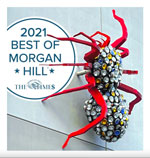The City of Morgan Hill will not place a revenue measure on the Nov. 3 ballot, as council members were unable to agree on what form such a request to the voters should take.
The council held a discussion on the possibility of going to the voters for a local special revenue measure at the July 15 meeting. Under consideration were three potential local taxes that would require varying levels of majority support in the Nov. 3 election: a utility users tax, local transaction and use tax or a business license tax.
All five council members—including the mayor—agreed that the city is desperately in need of new revenue sources just to maintain existing services. City officials have made that argument for several years, but the ongoing revenue shortfall problem is compounded this year by the Covid-19 pandemic and related shutdown of business activity.
Council members July 15 also noted that the pandemic has likely resulted in loss of household income for many Morgan Hill residents, and a new tax would be too burdensome. The council also worried that without steadfast, enthusiastic support among all five elected officials for a general election revenue measure, the vote would likely fail.
“I’m a little concerned we don’t have a consensus here,” Council member John McKay said. “I would like to see us working together as a council, and as a community.”
McKay added that the council and city staff should ramp up its efforts to communicate to the public and the voters about the city’s revenue losses, and the resulting decline of services that residents have become used to.
Earlier in the meeting, Council member Rene Spring said he would not support placing any of the three tax options on the Nov. 3 ballot, chiefly due to the pandemic-induced economic downturn.
As a result of the pandemic, the city’s sales and hotel tax receipts, as well as recreation user fees, have plummeted. The 2020-22 budget, approved by the council in June, cuts about $5 million worth of existing services.
Mayor Rich Constantine described this situation as “shortfalls on top of shortfalls.”
“Without tax revenue that can support our services, our services are going to be hit tremendously. There’s no sugar coating that,” Constantine said.
Of the three special revenue options discussed at the July 15 meeting, the business license tax generated the most questions from council members. City staff noted that Morgan Hill’s current business license formula has not been updated in several years, and generates about $58 per business per year.
An update to the business license tax could charge businesses incrementally for gross receipts, employees per unit or square footage—depending on what the council would have directed. Such an update could generate up to $1 million more revenue for the city’s general fund, according to city staff.
Council members argued that with growing opposition among residents to new large-scale warehousing or distribution centers in Morgan Hill, a tax on square footage might make sense.
Council member Larry Carr said even without a ballot measure, the city should continue to look into efforts to update its current business license fees.
“I would like us to continue the conversation about us modernizing and updating our business license tax,” Carr said. “I think our business license tax is regressive and unfair to small businesses in Morgan Hill.”








